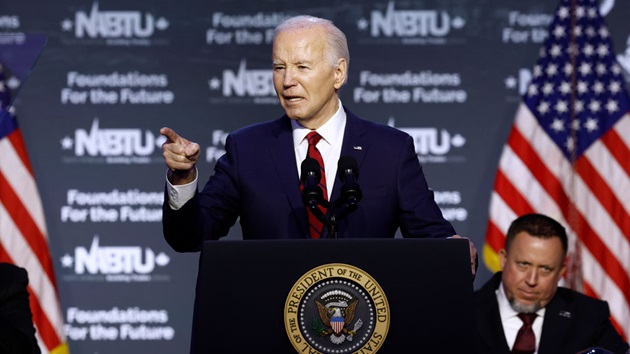
(WASHINGTON) -- In the summer of 2019, only hours after an Iranian rocket accidentally exploded at one of Iran's own launch sites, senior U.S. officials met with then-president Donald Trump and shared a sharply detailed, highly classified image of the blast's catastrophic aftermath.
The image was captured by a U.S. satellite whose true capabilities were a tightly guarded secret. But Trump wanted to share it with the world -- he thought it was especially "sexy" because it was marked classified, one of his former advisers later recalled to special counsel Jack Smith's investigators, according to sources familiar with the former adviser's statements.
Worried that the image becoming public could hurt national security efforts, intelligence officials urged Trump to hold off until more knowledgeable experts were able to weigh in, the sources said. But less than an hour later, while at least one of those intelligence officials was in another building scrambling to get more information, Trump posted the image to Twitter.
"It was so upsetting, and people were really angry," one of Trump's former advisers told investigators, sources said.
The public pushback to Trump's post was immediate: Intelligence experts and even international media questioned whether U.S. interests had just been endangered by what Trump did. When pressed about it at the White House, Trump insisted he hadn't released classified information because he had an "absolute right to do" it.
While much of Smith's sprawling classified documents investigation has focused on how Trump handled classified materials after leaving the White House, a wide array of former aides and advisers -- including personal valets, press assistants, senior national security officials, and even Trump's briefers from the Office of the Director of National Intelligence -- have provided Smith with firsthand accounts about how Trump allegedly handled and used intelligence while still in office.
Those firsthand accounts, as relayed to ABC News by sources, underscore what could be at stake as Trump seeks a return to the White House, and they are coming to light as he is likely on the verge of receiving formal government briefings again as the Republican Party's official nominee in the 2024 presidential election.
In interviews with investigators last year, former aides and national security officials who were close to Trump in the White House described a president who could erupt in anger when presented with intelligence he didn't want to hear, who routinely reviewed and stored classified information in unsecured locations, and who had what some former officials described as "a cavalier attitude" toward the damage that could be done by its disclosure, according to sources.
A book published on the CIA's website, describing the intelligence community's experience with Trump during his transition to the presidency and then his time in the White House, said that while Trump was "suspicious and insecure about the intelligence process," he still "engaged with it," even as he publicly attacked it.
The book also noted that Trump was "unique" among presidents in that, before taking over the White House, "he had no experience handling classified information or working with military, diplomatic, or intelligence programs and operations."
'Hand in the woodchipper'
As former officials described meetings with Trump to Smith's team, Trump only wanted to listen to new information about certain parts of the world, according to sources.
In particular, the sources said, Smith's team was told that Trump was uninterested in hearing about Latin America or countries that he similarly thought were not essential. The sources said witnesses confirmed previous public reporting that Trump referred to such places as "s---hole countries" and suggested the United States should stop welcoming migrants from them.
Today, on the presidential campaign trail, Trump continues to rail against migrants from Latin American countries and others who reached the southern border through parts of Latin America.
Sources said former officials also told Smith's team that Trump refused to listen to certain briefings related to Russia, saying Trump "absolutely" didn't want to hear about Russian influence operations, and he couldn't be convinced that Russian troops were already operating inside Ukraine -- even as his own administration was publicly calling out their routine incursions into the country's eastern region to support Russian-backed separatists.
On the campaign trail, Trump recently insisted that he would have prevented Russia's all-out invasion of Ukraine in February 2022 if he were still commander-in-chief.
Family of man killed when Chicago police fired 96 times during traffic stop file wrongful death suit
According to the sources, one of Trump's former advisers joked with Smith's team last year that bringing up Russia during a meeting with Trump was like "stick[ing] my hand in the woodchipper again."
In its most recent worldwide assessment, the Office of the Director of National Intelligence concluded that Russia continues to pose a significant threat to U.S. national security and, more broadly, to "rules-based international order."
As he has done in public, Trump often privately disagreed with conclusions reached by the U.S. intelligence community, especially related to Russia and Ukraine, choosing instead to rely on unverified claims from other people, sources said that Smith's investigators were told.
And sources said former aides confirmed to Smith's investigators previous media reports that Trump almost never read the President's Daily Brief, a report summarizing classified intelligence and analysis on the day's most pressing issues.
Trump preferred to receive such summaries verbally, according to sources.
Reached for comment, a spokesperson for Trump referred ABC News to a statement by the former president in which he called the classified documents case a "two-tiered system of justice and unconstitutional selective prosecution."
A spokesperson for the special counsel declined to comment to ABC News.
'Like a junk drawer'
Throughout Trump's presidency, many of those who interacted with Trump every day saw him bring classified documents to unsecured locations, raising concerns among some of them, several witnesses told Smith's team, the sources said.
As early as 2018, the Office of the Staff Secretary, which manages the documents flowing to the Oval Office, began asking personnel in the White House about documents that had gone missing, including some classified ones, one of Trump's personal valets told investigators, sources said.
And at one point, sources said the valet recalled, he even warned the staff secretary's office that classified documents were being taken out of secure locations in white boxes and ending up in all sorts of potentially concerning places.
According to the sources, several witnesses told Smith's team that they routinely saw classified documents or classified folders in Trump's White House residence, and that Trump would sometimes store as many as 30 boxes in his bedroom, which one valet said Trump treated "like a junk drawer."
While it's not clear how many boxes at any given time in Trump's residence contained documents with classification markings, witnesses said they frequently observed boxes and papers traveling from the Oval Office to his residence that contained classified documents, according to sources familiar with what witnesses have told the special counsel.
"I did not think that he respected what classified information was," sources quoted one former official as telling investigators.
In Trump's first year in office, several media reports described how Trump had allegedly exposed sensitive information: In February 2017, he and Japan's then-prime minister reportedly discussed a response to North Korea's latest ballistic missile test over dinner in a crowded dining room at Trump's Mar-a-Lago estate in Florida, and then two months later Trump told the Philippines president on a phone call that the U.S. military had positioned two nuclear submarines near North Korea.
The following month, Trump reportedly shared highly-sensitive intelligence about ISIS with Russian officials visiting the White House.
Some witnesses who spoke with Smith's team, however, said they were not concerned by what they saw while Trump was president.
Robert O'Brien, who served as Trump's national security adviser at the end of his presidency, told Smith's team that Trump "consistently" handled classified information appropriately, sources said.
'The Hunger Games'
As some former officials described it to Smith's investigators, discussing the latest intelligence with Trump could be an unpredictable task, sources said.
At times he would become so upset over what senior national security or intelligence officials were telling him that it would derail entire meetings, according to sources familiar with what witnesses told investigators.
In one series of meetings, ahead of an international summit in Europe, Trump met with then-CIA director Gina Haspel, then-Treasury Secretary Steve Mnuchin and others to help plan for the summit. But when Trump was told positive things about one of the people he would likely meet at the summit, Trump "lost it," insisting that he didn't care, then he "lost it" again when he was being updated on a tax-related negotiation involving Mnuchin, sources said.
The sources said Trump then pitted one of his top aides against Mnuchin in front of everyone else, escalating the tension so much that it reminded one of those present of the movie "The Hunger Games," with its dystopian death match broadcast live on national TV.
The book published on the CIA's website quoted former President Barack Obama's director of national intelligence, James Clapper, as saying that Trump was prone to "fly off on tangents; there might be eight or nine minutes of real intelligence in an hour's discussion."
And while the intelligence community worked with evidence, Trump "was 'fact-free' -- evidence doesn't cut it with him," according to Clapper.
Still, Clapper said Trump could be "courteous, affable, and complimentary" when he engaged with or referred to members of the U.S. intelligence community.
'People were really angry'
Sources said that, as one former official described it to Smith's team, Trump's posting of the image from Iran's failed rocket launch revealed how the then-president "just didn't care" about protecting classified information.
In 2021, Yahoo! News described how, during his briefing with intelligence officials, Trump thought the image "was very neat, and asked if he could keep it," which made some of the intelligence officials nervous, according to an administration official. But that news report didn't offer the same detailed account provided to Smith by witnesses last year.
Sources told ABC News that while speaking with Smith's team, former aides and officials said Trump was specifically warned at the time that while he had the authority to declassify the image of Iran's botched launch, there were also potential risks associated with doing that.
Trump initially agreed to wait while intelligence officials were then consulted, sources said, but the intelligence officials apparently took too long; about an hour later, Trump posted the image online.
"I was so appalled," one former national security official told Smith's team, according to the sources.
The former official noted that Trump may have believed it wasn't a big deal -- but only an expert would know if releasing such classified information could reveal "how we got it" it and whether it could "compromise our ability to get [it] in the future," the former official explained to Smith's team, according to the sources.
Copyright © 2024, ABC Audio. All rights reserved.
























